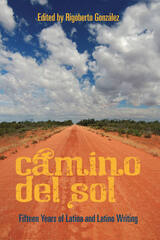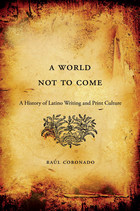
Featuring both established writers and first-time authors, Camino del Sol has published poetry and prose that convey something about the Latina/o experience—works that tap into universal truths through a distinct cultural lens. This volume celebrates fifteen years of books by bringing together some of the series’ best work, such as poetry from Francisco X. Alarcón, fiction from Christine Granados, and nonfiction from Luis Alberto Urrea. These voices echo the entire spectrum of Latina/o writing, from Chicana/o to Puerto Rican to Brazilian-American, and take in themes ranging from migration to gender.
Awards bestowed upon Camino del Sol titles include the PEN/Beyond Margins Award to Richard Blanco’s Directions to the Beach of the Dead; Before Columbus Foundation American Book Awards to Diana García’s When Living Was a Labor Camp and Luis Alberto Urrea’s Nobody’s Son; International Latino Book Awards to Pat Mora’s Adobe Odes and Kathleen Alcalá’s The Desert Remembers My Name; the Premio Aztlán literary prize to Sergio Troncoso’s The Last Tortilla; and the PEN Oakland-Josephine Miles National Literary Award to Kathleen de Azevedo’s Samba Dreamers. All of these works are represented in this outstanding collection.
In a short span of time, Camino del Sol has cultivated an admirable and sizeable list of distinguished contemporary authors—and even garnered the first National Book Critics Circle Award for a Chicana/o for Juan Felipe Herrera’s Half of the World in Light. Camino del Sol: Fifteen Years of Latina and Latino Writing is a benchmark for the series and a wonderful introduction to the world of Latina/o literature.

A shift of global proportions occurred in May 1808. Napoleon Bonaparte invaded Spain and deposed the Spanish king. Overnight, the Hispanic world was transformed forever. Hispanics were forced to confront modernity, and to look beyond monarchy and religion for new sources of authority. A World Not to Come focuses on how Spanish Americans in Texas used writing as a means to establish new sources of authority, and how a Latino literary and intellectual life was born in the New World.
The geographic locale that became Texas changed sovereignty four times, from Spanish colony to Mexican republic to Texan republic and finally to a U.S. state. Following the trail of manifestos, correspondence, histories, petitions, and periodicals, Raúl Coronado goes to the writings of Texas Mexicans to explore how they began the slow process of viewing the world as no longer being a received order but a produced order. Through reconfigured publics, they debated how best to remake the social fabric even as they were caught up in a whirlwind of wars, social upheaval, and political transformations.
Yet, while imagining a new world, Texas Mexicans were undergoing a transformation from an elite community of "civilizing" conquerors to an embattled, pauperized, racialized group whose voices were annihilated by war. In the end, theirs was a world not to come. Coronado sees in this process of racialization the birth of an emergent Latino culture and literature.
READERS
Browse our collection.
PUBLISHERS
See BiblioVault's publisher services.
STUDENT SERVICES
Files for college accessibility offices.
UChicago Accessibility Resources
home | accessibility | search | about | contact us
BiblioVault ® 2001 - 2024
The University of Chicago Press









